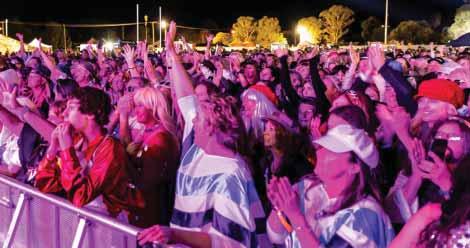
7 minute read
Good to be Back?
Muddy festivalgoers Credit: Shutterstock.
Karen Sweaney charts how rising costs, crowded calendars and La Nina are presenting a new tide of challenges for live events and outdoor entertainment
Advertisement
The reopening of the economy after the pandemic was meant to herald a massive return to live entertainment. After all, ‘live’ was an area that could not be adequately replicated in home or via virtual environments.
Yet, a range of challenges have emerged that are impacting fans and patrons getting out and experiencing ‘in person’ entertainment.
After people eagerly returned to live entertainment as states opened up as of the autumn, artists sought to try and recover income that they had lost when not being on the road for the best part of two years and recoup their losses by raising their ticket prices.
Zac Messih, Senior Content and Partnerships Marketing Manager at Audience Republic, explains “while the cost of tickets for smaller venues - clubs and theatres - hover around the same price point as they were pre-COVID, the ticket price of larger shows - amphitheatres and stadiums - has skyrocketed.”
With ticket inflation quickly followed by wider inflationary pressures across the wider economy, coupled with stagnating wages, discretionary spending on entertainment becomes a casualty.
In addition, Messih adds “the sheer amount of shows and tours has increased significantly as consumers and artists are becoming more comfortable with going out.
“Concert calendars are already clogged and, if you live in a major market, you may find that several of your favourite artists are performing on the same night, forcing consumers to pick and choose.”
Costs are also impacting artists as well as consumers, with tours being cancelled because of rising travel and insurances cost and uncertainty over ticket sales.
In September, US musician Santigold published a long statement to social media announcing the cancellation of her upcoming Holified tour.
Citing two years of no income; the skyrocketing cost of gas, flights, and hotels; a flooded market of delayed tours, leading to overbooked venues and audiences; and the risk of infection, alongside general exhaustion and poor mental health, she wrote “as a touring musician, I don’t think anyone anticipated the new reality that awaited us (after the pandemic).
“I think it’s important for people to know the truth of what it’s like out here for artists … and I don’t believe enough of us are talking about it publicly.”
September also saw UK rapper Stormzy cancel his upcoming Australia and New Zealand tour - three years after the original announcement; Justin Bieber once again postponed his world tour, citing health reasons; and Australian alt rockers Gang of Youths cancelled their upcoming North American dates, with their frontman, Dave Le’aupepe, writing in a statement “I’m getting to the point where the stress of travel, illness and feeling constantly hampered by injuries and physical shit sustained on the road is taking a significant toll on my wellbeing overall.”
Festivals, have also been impacted by rising costs along with staffing issues, supply chain shortages and inconsistent consumer confidence and the added impact of weather events – with flood and rain events replacing the pre pandemic impact of bushfires. Gaining national attention when the first day of the returning 2022 Splendour in the Grass was cancelled in July due to heavy rain, extreme weather events have caused the cancellations or postponements at multiple outdoor events and music festivals in recent months. Scenes of fans caked in mud at Splendour in the Credit: Splendour in the Grass. Grass was just the start of a



Strawberry Field Festival was cancelled due to weather conditions. This That Festival cancelled becuase of issues with supply chain and labour shortages.
period of ongoing wild weather events impacting organisers, artists and attendees alike.
Strawberry Fields, described as “four days of live music, large-scale art, workshops and wild river swimming” held on the Murray River in Tocumwal, was to have been held from 28th to 30th October.
However, after watching flood levels on the Murray River rise well into September, organisers made the call to cancel the event a month out from the festival, immediately before on-site construction needed to start.
Other festival cancellations included the This That Festival, Yours and Owls, Jungle Love and Shellharbour Rocks the Park.
Shellharbour City Council made the difficult decision to cancel Shellharbour Rocks the Park, a country and blues music festival that was scheduled to go ahead Saturday 8th October at Albion Park Showground.
Shellharbour City Deputy Mayor Kellie Marsh said the rain had already impacted the site and the predicted weather had left the Council with no other choice, explaining “the events team is not able to set up the site safely, posing a high risk for attendees, Council’s contractors, partners, crew and artists.
“I know that many people were looking forward to this unique event. I admire the dedication of Council staff and their efforts to try and bring the community a free, high-quality family festival that reflects the country village character of Albion Park. We are extremely saddened and disappointed to have to make this decision.”
Parkes Shire Council also made the difficult decision to cancel the 2022 Trundle ABBA Festival scheduled to be held on 15th October.
Parkes Shire Mayor, Ken Keith said the decision to cancel the event was made after Council received a briefing from the NSW State Emergency Service and Resilience NSW, regarding widespread heavy rain forecast for much of the state.
Mayor Keith advised “we left the final decision for as long as possible, hoping for an improved forecast, but unfortunately, the forecast has deteriorated rather than improved.
“For all involved, we need to make a decision far enough in advance so people don’t get caught out with a last-minute, adhoc decision, and alternative arrangements for attendees and suppliers can be made.
“As a consequence of the severe weather predictions, our insurance provider advised us last week, that they would no longer be able to provide flood and wet weather coverage for the Trundle ABBA Festival, and we have not been able to source alternative insurance coverage.
“While we explored options to reschedule the festival to a later date; the reality is that we can continue to expect above average rainfall to at least the end of the year, and potentially into the New Year, with the likelihood of being able to secure flood and wet weather insurance remaining slim.”
Mayor Keith said all ticket holders will have the price of their tickets refunded, noting “we know how disappointing this is for all those who had purchased tickets and were looking forward to attending the first ABBA Festival since 2019, as well as the Trundle community, who were looking forward to welcoming ABBA fans back, but we appreciate everyone’s understanding, given the situation we find ourselves in.”
Parkes Shire Council had agreed to deliver the Festival, after having been approached by the former event organisers to assume responsibility for the event.
Mayor Keith added “unfortunately, the ongoing unpredictability of weather cycles, coupled with the difficulty of obtaining events insurance coverage, means that hosting outdoor events is certainly a high-risk business.”
Climate change related extreme weather events are becoming more frequent across Australia and conditions are intensifying.
The Australian Actuaries Climate Index measures extreme weather conditions in the country, recording changes in the frequency of extreme high and low temperatures, heavy rainfall, dry days, strong winds and changes in sea level.
This autumn, the index recorded its highest measurement since records began in 1981.
Such unpredictability is impacting insurance costs.
Strawberry Fields has had to meet the cost of cancellation out of pocket as it was unable to secure insurance coverage in time, despite beginning talks with insurance brokers in July, much earlier than usual.
Such delays are not unusual and correlate with rising premiums, not only for event cancellations but also public liability insurance with, as Australasian Leisure Management has frequently reported, the market tightened across many areas of the industry over the past few years.
Commenting on the challenge, Stephen Wade, Executive Chairman of Select Music and Chair of the Australian Live Music Business Council, explains “it’s a unique time for us where these weather patterns consistently continue to throw havoc at our industry.
“There are events that have 30,000 attendees, and the people promoting these shows are literally in the lap of the gods leading up to the shows, hoping that they’re not going to be absolutely smashed with weather.” Karen Sweaney is Editor of Australasian Leisure Management.











